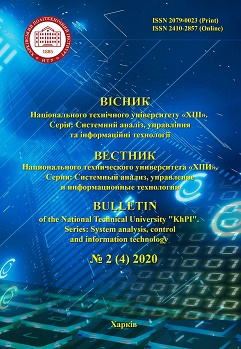IDENTIFICATION OF PROBLEM SITUATIONS IN FUNCTIONAL DIAGNOSTICS OF INTELLIGENT BUSINESS SYSTEMS
DOI:
https://doi.org/10.20998/2079-0023.2020.02.01Keywords:
intellectual business system, functional diagnostics, identification of the problem situation, algorithmic model, hierarchy analysis method, base of precedentsAbstract
The paper discusses the issues of increasing the efficiency of production activities of an intelligent business system operating in a dynamic environment by reducing its losses by creating a subject technology for reliable identification of problem situations in the process of functional diagnostics of a business system. The object of the research is an intelligent business system of the IT industry, which produces intelligent products, the results of which depend on the mental abilities of its personnel, who own effective intelligent information technologies. The problem-containing environment was chosen as the basis for analyzing the problem situation, in the depths of which the problem situation arises, develops and manifests itself. A problem-containing environment is characterized by structure and behavior. The behavior of the problem-containing environment is determined by the multidimensionality of the ongoing business processes, their interaction and dynamics. To identify deterministic and non-deterministic problem situations, it is proposed to set them by bipartite graphs and use the technology of inference based on precedents, which has serious advantages over the method of inference based on knowledge. In this work, a cognitive method is used to analyze problem situations of an intelligent business system. The basis of cognitive analysis is formed by the problem-containing environment, in the depths of which the problem situation arises. To study the problem-containing environment, the method of analysis of hierarchies is used, the basis of which is a hierarchy which is a system of levels, each of which consists of elements, factors of the problem-containing environment and an intelligent business system. A complex of models has been developed to construct a bipartite graph of a problem situation and to analyze its problem-containing environment. On the basis of a complex of models, a subject technology for identifying problem situations arising in the process of functional diagnostics of intelligent business systems has been created. The results obtained can be used as a theoretical platform for creating an information technology for functional diagnostics of intelligent business systems operating in a dynamic environment.References
Alekseeva M. B. Metody i modeli diagnostiki sostoyaniya biznessistemy [Methods and models for diagnosing the state of a business system]. Murmansk, Private educational institution of higher education “MOU” Publ., 2016. 84 p.
Makarov V. L., Varshavky A. E. Innovatsyonnyi menedjment v Rossii: voprosy strategicheskogo upravliniya i nauchnotehnologicheskoi bezopasnosti [Innovation management in Russia: issues of strategic management and scientific and technological security]. Moskow, Nauka Publ., 2004. 316 p.
Sovetov B. Y., Tsekhanovsky V. V., Chertovsky V. D. Intellektual’nye sistemy i tehnologii [Intelligent systems and technologies]. Moskow, Nauka Publ., 2004. 320 p.
Vasiliev V. I., Ilyasov B. G. Intellektual’nye sistemy i tehnologii. Teoriya i praktika [Intelligent control systems. Theory and practice]. Moscow, Radiotekhnika Publ., 2009. 392 p.
Thompson Arthur A., Strickland A. J. Strategic Management: Concepts and Cases. Boston, Mass.: McGraw-Hill/Irvin, 2001. 928 p. (Russ. ed.: Thompson, A. A., Strickland, A. J. Strategicheskiy menedjment. Kontseptsii i situatsii. Moscow, Vil'yams Publ., 2006. 928 p.
Shifrin M. B. Strategicheskiy menedjment [Strategic management]. Saint Petersburg, Piter Publ., 2007. 320 p.
Lisitsky V., Gernet N. Prognozirovanie i planirovanie perehodnyh processov v organizatsiyah [Predicting and planning organizational transitions]. Saarbrucken LAP LAMBERT Academic Publishing, 2015. 364 p.
Pospelov D. A. Situatsionnoe upravlenie. Teoriya i praktika [Situational management. Theory and practice]. Moscow, Nauka Publ., 2007. 228 p.
Karpov L. E., Yudin V. N. Adaptivnoe upravlenie po precedentam, osnovannoe na klassifikacii sostoyanij upravlyaemyh ob’ektov. [Adaptive use case management based on the classification of the states of managed objects]. Trudy Instituta sistemnogo programmirovaniya. 2007, vol. 13, no 2, pp. 37–58.
Kuzhelev P. D. Upravlenie na osnove metoda pretsedentov [Management based on the precedent method]. Vestnik MGTU MIREA. [Herald of MSTU MIREA]. Moscow, Bulletin of MSTU MIREA Publ., 2014, no. 4. pp. 28–30.
Saaty Thomas L. The Analytic Hierarchy Process: Decision Making in Complex Environments. New York. Plenum Press, 1984, 258 p. (Russ. ed.: Saaty T. Prinjatie reshenij: metod analiza ierarhij. Moscow, Radio and communication Publ., 1993. 278 p.).
Glukhikh I. N. Intellektual’nye informatsionnye sistemy [Intelligent information systems]. Saint Petersburg, Piter Publ., 2019. 136 p.
Gavrilova T. A., Khoroshevsky V. F. Bazy znaniy intellektual’nyh system [Knowledge base of intelligent systems]. Saint Petersburg, Piter Publ., 2001. 384 p.
Korneev V. V., Gareev A. F., Vasyutin S. V., Raikh V. V. Bazy dannyh. Intellektual’naya obrabotka informatsii [Database. Intelligent information processing]. Мoscow, Nolidj Publ., 2001. 400 p.
Tsvetkov V. Ya. Cognitive information models. Life Science Journal. 2014, vol. 11, no. 4, pp. 128–133.
Romanov V. P. Intellektual’nye informatsionnye sistemy v ekonomike [Intelligent information systems in the economy]. Moscow, Examen Publ., 2007. 496 p.
Titarenko G. A. Informatsionnye tehnologii upravleniya: Uchebnoe posobie dlya vuzov [Information Technologies of Management: Textbook for universities]. Moscow, Unity-Dana Publ., 2013. 423 p.
Downloads
How to Cite
Issue
Section
License
Copyright (c) 2020 Bulletin of National Technical University "KhPI". Series: System Analysis, Control and Information TechnologiesAuthors who publish with this journal agree to the following terms:
- Authors retain copyright and grant the journal right of first publication with the work simultaneously licensed under a Creative Commons Attribution License that allows others to share the work with an acknowledgement of the work's authorship and initial publication in this journal.
- Authors are able to enter into separate, additional contractual arrangements for the non-exclusive distribution of the journal's published version of the work (e.g., post it to an institutional repository or publish it in a book), with an acknowledgement of its initial publication in this journal.
- Authors are permitted and encouraged to post their work online (e.g., in institutional repositories or on their website) prior to and during the submission process, as it can lead to productive exchanges, as well as earlier and greater citation of published work (See The Effect of Open Access).


